Ash Barty book extract: Australian tennis great reveals how she overcame body image struggle
Super-fit Australian tennis great Ash Barty has revealed a years-long struggle with her body image that left her with crippling insecurities. Here’s how she turned it around.
Tennis
Don't miss out on the headlines from Tennis. Followed categories will be added to My News.
Ash Barty has revealed she suffered deep insecurities over her body image as a young tennis star – opening up about the issue in the hope of comforting those wrestling with the same anxieties.
The athlete, who grew up to conquer the courts on the world stage, says that as a teenage professional she was so conscious of not having the stereotypical tennis physique she would change in a private cubicle while comparing herself to “aesthetically beautiful goddesses from South America and Eastern Europe” striding around the locker room.
The revelations come in Barty’s memoir My Dream Time, where she writes, “I had massive insecurities about my body, which developed, as they often do for girls, when I was around 13, maybe even younger.”
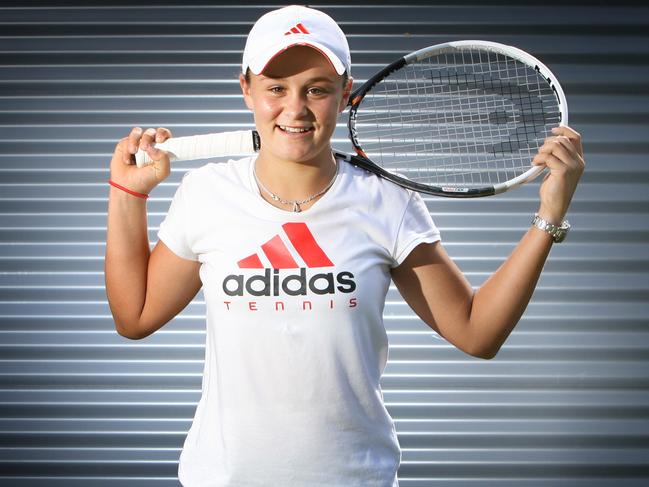
The situation was worsened by functional weight gain from training – plus navigating unfamiliar foods and comfort eating when homesick or bored on tour.
Watch Tennis Live with beIN SPORTS on Kayo. Live Coverage of ATP + WTA Tour Tournaments including Every Finals Match. New to Kayo? Start your free trial now >
“It was definitely daunting as a young girl,” Barty told News Corp ahead of the book’s release.
“I went through that like a lot of people do and a big part of my passion now is to encourage girls and boys to be comfortable in themselves.
“It helped me realise that imperfections are part of all of us and they are OK. By sharing some of my insecurities hopefully it can help them realise a lot of people go through it. This is a very common issue.’’
In her memoir, Barty makes the frank admission shortly after sharing how she began to suffer from anxiety and crushingly low mood swings around tournaments – something she addressed with therapy, having at least been able to recognise what could be happening as a result of witnessing her own father grapple with depression.
Even with help, she reveals, “I had enough issues just being a girl in the world.”
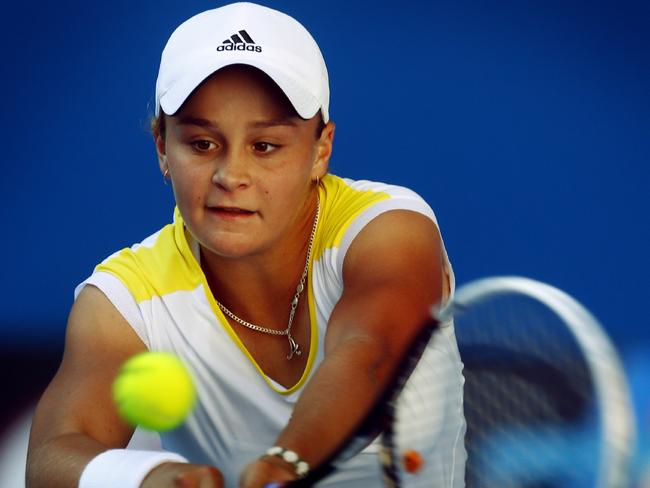
“I’m not built like other girls – I’m built like an athlete,” she writes.
“I hated the way the training showed.
“I couldn’t celebrate being unique because I was too worried about being seen to be different – not just by the public but by those around me. When I was 15 and won that wildcard entry into the Australian Open, I remember talking to people about the thrill of it all, but I never mentioned the terror.
“I didn’t tell anyone what I felt like sharing a locker room with women who had trained their entire lives to be lean and long and strong – athletically gifted and aesthetically beautiful goddesses from South America and Eastern Europe.
“I didn’t tell anyone about how they would walk around without a towel on and I wouldn’t know where to look, only that I didn’t want anyone seeing me so exposed. I got changed in a shower cubicle each day.
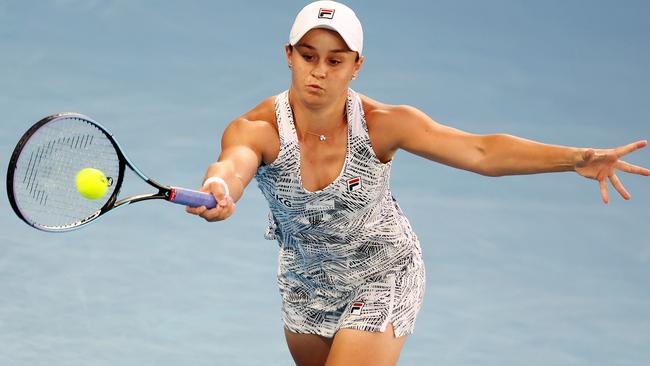
“By the time 2014 rolled around and I was 17 years old, none of that discomfort or unease or modesty or confusion had been shaken. I was still a girl, still trying to figure out what I wanted, still unwilling to jump in with both feet.’’
But Barty surged through her body image blues to turn the narrative upside down.
“I ended up changing my thinking and in the last three years of my career I trained in a way that made my body a weapon,” she told News Corp.
“When I played my best I knew girls could not get the ball past me.
“I may not look like everyone else but it was really invigorating to know I had trained my body to do exactly what it needs to do.”
My Dream Time: A Memoir Of Tennis & Teamwork by Ash Barty will be published by HarperCollins on November 2 and is available to pre-order now.
MY MATE TRENT THE TIGER
Ash Barty does not have a big brother, but there are times when Richmond AFL captain Trent Cotchin appears to fill this role in her life.
This much is clear from the pair’s close relationship, which extends not simply through the fact that Barty is a Richmond tragic, but because they both work closely with mindset coach Ben Crowe – a key member of Barty’s inner circle.
The athletes first met a decade ago, when Barty was based in Melbourne. They would run together, watch each other train, and she would go to Cotchin’s house for dinner with his wife Brooke and kids, she reveals in memoir My Dream Time. And the bond remains strong.
“Because he is an exceptional human being he has this sense of knowing when I need a mate, when I need a coffee or a text,” Barty told News Corp. “He has this incredible ability to uplift people and lead people and be funny and joke around and lighten things up.
“He has been so kind to me. It’s pretty amazing. As athletes we can share our journey.”
At key times in her career, Barty has found texts from Cotchin the perfect tonic, especially after her biggest disappointments.
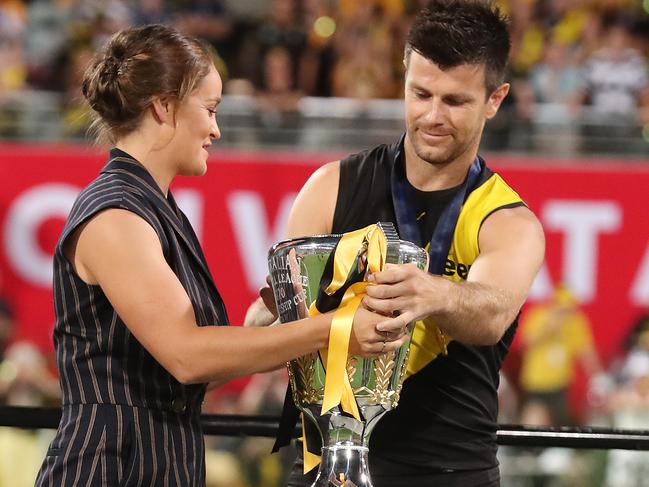
“He tends to send messages that go like this: It was a tennis match. You lost. Get over it. No big deal. I love you, mate,” Barty writes in her book.
One example of Cotchin’s ability to send the right message at the right time came after Barty was shattered by a 2021 Australian Open quarterfinal loss to Karolina Muchova after winning the first set 6-1 a break up in the second set.
“Right now, I feel judged. She’s thrown it away. She’s screwed it up. She’s choked,” she writes. “Cotch knows how easy it is to hear those voices, so he replaces them with the affirmations he’s found in football.
“One of them is ‘You haven’t been buried, you’ve been planted’, but my favourite is his personal mantra: ‘Your greatest growth comes from your darkest times.’
“In this dark time, he sends me a long text, explaining how he was able to watch me play until late in the second set, when I was faltering. So he didn’t see the collapse, but he read about it later.”
“The text read: “Ash, I know nothing will really help, nor change anything, as you have all the answers, and you know it doesn’t change the incredible human you are and the impact you’re having on others.
“I’m proud of your continued growth! I’m grateful to watch and learn from you on how to be a special and authentic human being! Love you, mate! Chat to you soon.”
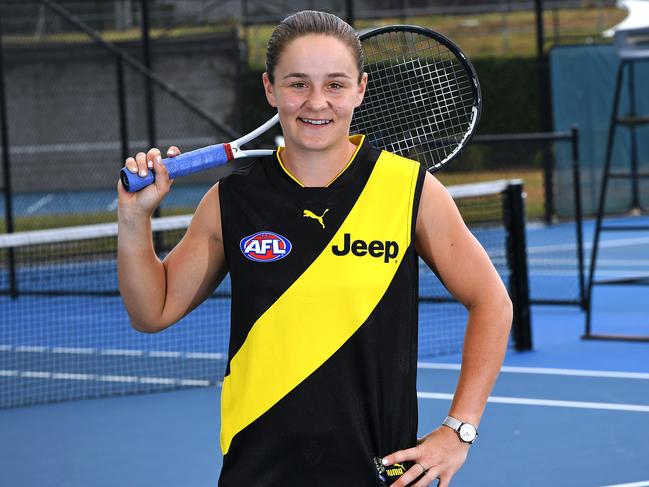
WEDDED BLISS AND THE JOURNEY WITH GARRY
When Garry Kissick met Ash Barty he didn’t care a jot about tennis … and she loved it.
Even more than that, she felt she needed it to be that way.
Gladstone-born Kissick first met golf-loving Barty in late 2016 at Brookwater Golf Club where he was a trainee golf professional, a position he deferred so he could follow Barty on tour more in 2020.
The couple – who married earlier this year – are very private and have never been part of sport’s red carpet set, but Kissick has been the most underestimated part of Barty’s success.
His support coincided with Barty finding peace of mind on the road in the second part of her career which featured three Grand Slam victories.
“I am so appreciative of Garry’s unwavering unconditional love for all of us and our journey as a team which has been a massive part of our success,” Barty told News Corp.
“I was very lucky when our paths crossed when they did. Everything happens for a reason. The journey and the adventure we had together was just so much fun.
“It was not a matter of him having to fit in – he just belonged.”
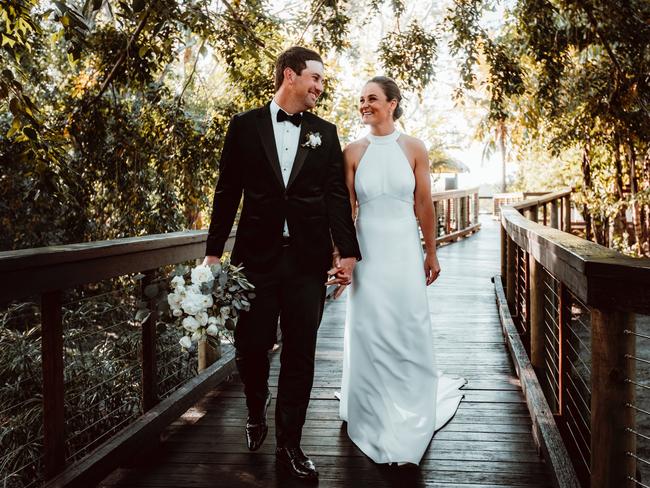
Barty opens up further about her man in her memoir My Dream Time, writing with obvious feelings about his place in her life, her team and her heart.
“I knew he had never been interested in tennis, but then I learnt the depth of that blind spot. He didn’t watch tennis. Didn’t like tennis. Didn’t understand the rules of tennis. The game had no meaning to him – and I liked that. In truth, I needed that,” she discloses.
“It shouldn’t matter so much but it seemed crucial in my mind that my partner be interested in me in spite of tennis and not because of it, and that was Garry.
“We met through the golf club, both playing. I found him to be instantly authentic and genuine. He’s funny too. In any list of traits that women find appealing in men, being funny is always in the top two, which makes sense.”
Barty reveals that they only had a few dates before she went overseas on tour, so they got to know each other with long-distance phone calls and messages. “It was a different way to start a relationship, but nothing we’ve ever done has been normal,” she adds.
“He’s been with me since I had only just picked up a racquet again when I was unranked, just a girl called Ash who apparently was decent at tennis a few years back. He loved me for me and became the most important cog in the second phase of my career.”
“Garry threw himself into the deep end too. He would watch all of my matches no matter where I was playing, no matter whether it meant sitting up late, alone in front of a flat screen or squinting in the sunshine somewhere, trying to follow a live stream on his phone.
“And, afterwards, he was always the first person to message me, win or lose.”
Barty reveals she was so upset when Garry had to fly home for work, after being with her at the 2019 Italian Open, that she started crying during a match against Kristina Mladenovic.
“All I could picture was Garry in a cab, Garry at the airport, Garry on a plane and me here left all alone. I couldn’t focus. I was crying on court and once I got off the court my tears were out of control,” she writes.
Describing the fun-loving 31-year-old as a strong, fun-loving “big softie” with a short fuse, Barty says: “I love that when Liverpool is playing I know Garry will be wearing one of his 50-odd jerseys. I love that if I give him any chance to control the sound system at home, DJ Dillon Francis will be blaring. I love that – despite my tendency towards obsessive compulsive disorder – Garry shows not even a flickering desire to place his socks in the sock drawer and instead simply sheds his clothes at the end of the day letting them fall wherever they are removed.”
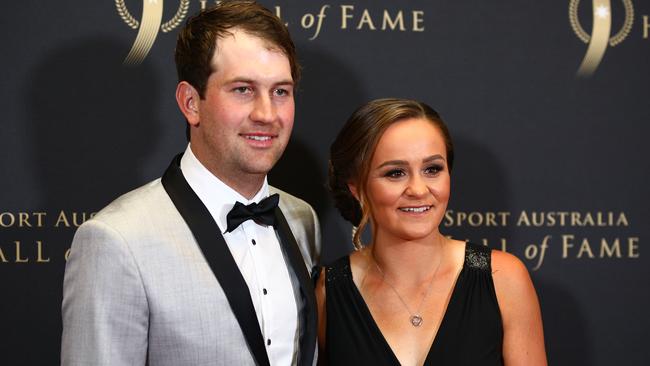
BARTY’S BLACK LIST
Ash Barty is one of the tennis world’s most popular stars – but she doesn’t click with everyone.
For that she makes no apologies and has no complaints, because it stokes a fire within her.
In her memoir My Dream Time, Barty makes the fascinating disclosure that she has a Black List of the fellow players she dislikes and with whom she loves to “wipe the floor’’.
She does not name names, but Barty’s entourage know who those women are.
“There are girls I dislike playing, and girls I just plain dislike – mostly those who can’t separate who they are on and off the court,” she writes.
“You’re about to play them and they won’t look you in the eye or say hello. Or you beat them and they don’t talk to you for a week. Some fall into a fury when you give them a lesson during practice, unable even to train with detachment. I want to wipe the floor with those girls. I keep track of them, too, in a little black book inside my mind.’’
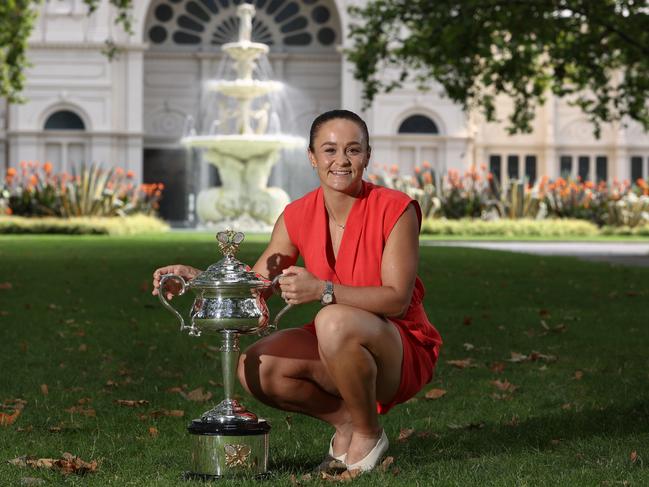
Asked by News Corp to explain whether the Black List gives her motivation to win she said: “Oh, hell yeah. Playing with that emotion and making it a bit more personal really helps”.
She added: “The biggest thing I struggled with was girls who could not separate the result from the relationship. I completely understand things being different for a few hours after the heat of the battle. But when it stretches on for weeks and months and sometimes years it is completely unnecessary.’’
On the other side of the coin, Barty also said there were rivals she was so fond of she had to find additional ways to motivate herself when she played them.
“The three that stand out are Jules Gorges, Kiki Bertens and Petra (Kvitova). They are three of my closest friends. It was as if the result genuinely didn’t matter. Against those three girls I had to find a way of putting myself in a competitive mindset.’’
INSPIRED BY FAMILY, NOT MONEY
Ash Barty did not play tennis for personal wealth – but the power of what it can do for others loomed large at a key crossroads in her career.
Barty famously quit tennis for 17 months as a teenager, playing Big Bash cricket instead.
Part of her motivation to return to professional tennis in 2016 was to pay the mortgages of her older sisters Ali and Sara and her parents Rob and Josie, in acknowledgment of the sacrifices they made for years, funding and facilitating her career.
In memoir My Dream Time, Barty tells how in her youth the family spent more than $60,000 a year on her tennis and missed out on things like holidays in order to support her. She reveals she was nervous to tell her Dad she was planning a return to the court, because he had already “given up so much for me – for a career I’d already abandoned once”.
But when the time came, she writes: “I remember walking into his room one evening, petrified to break the news. I don’t remember what I said, but he remembers. ‘I’m going back,’ I told him, ‘but do you know what I want out of tennis, Dad? I never want Sara or Ali or you or Mum to ever have to worry about money again.
“My parents had every right to resent my tennis obsession, as it derailed years of family plans, but they were only ever encouraging. My sisters had every right to be jealous of the way all attention was diverted to my hobby, but they were the first ones to bake me a #1 cake.
“Now I want to repay them all. Ali is a primary school teacher, taking classes for preps and Grade 1s at a small independent First Nations school. Sara is a nurse and midwife and lactation consultant at a private hospital in Ipswich. Mum and Dad both have good jobs too, but the home they raised me in isn’t yet fully their own.
“I don’t know how long it will take for any of them to pay off their mortgages, so I do it for them. I drown out their protests … because isn’t this the point of money? To make life easier and more comfortable for those you love, so that they can live out their dreams? It is the best money I’ve ever spent.”
Explaining her decision to News Corp, Barty said: “It was something I wanted to do. They gave up so much for me. I wanted them to have more of a free life and have fun and if that meant having that little family holiday or reconnecting as a family that’s great. Initially they said “no, no’’ but it’s a trait we got from mum and dad that Sara, Ali and I are very happy to give but we really struggle accepting things.”
More Coverage
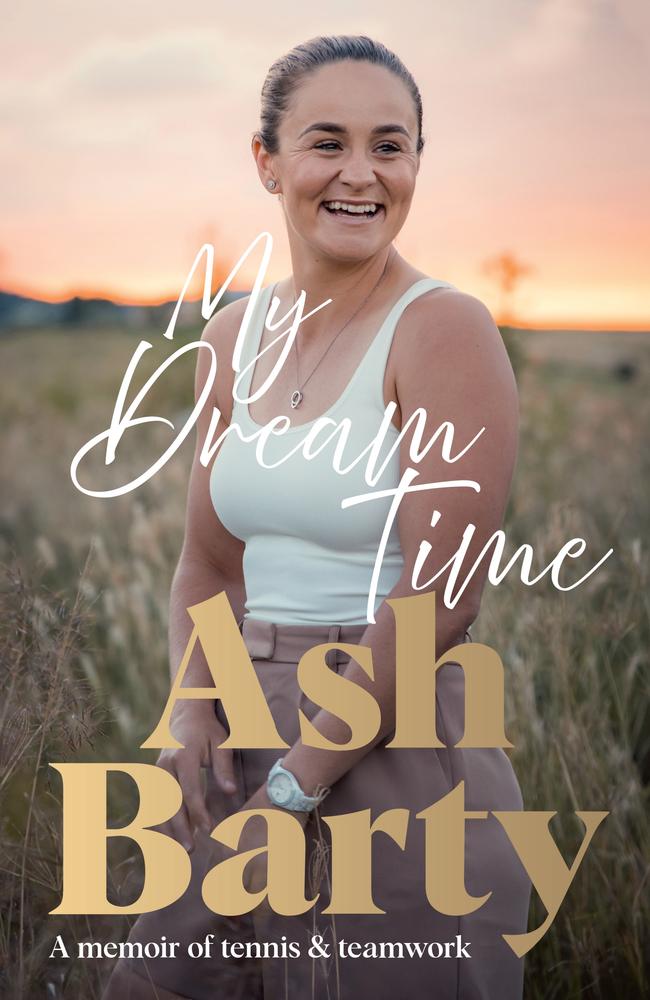
Originally published as Ash Barty book extract: Australian tennis great reveals how she overcame body image struggle





